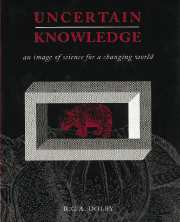Book contents
- Frontmatter
- Contents
- Preface
- 1 Introduction
- Part I The nature of science
- Part II Does science have distinctive qualities?
- 7 What, if anything, is distinctive about science?
- 8 How is good science to be distinguished from bad science?
- 9 A theory of the pathologies of science
- Part III Changing science in a changing world?
- Appendix: Summary of cases of marginal and disputed science
- References
- Index
7 - What, if anything, is distinctive about science?
Published online by Cambridge University Press: 28 January 2010
- Frontmatter
- Contents
- Preface
- 1 Introduction
- Part I The nature of science
- Part II Does science have distinctive qualities?
- 7 What, if anything, is distinctive about science?
- 8 How is good science to be distinguished from bad science?
- 9 A theory of the pathologies of science
- Part III Changing science in a changing world?
- Appendix: Summary of cases of marginal and disputed science
- References
- Index
Summary
Introduction to the distinctiveness issue
‘Science has transformed modern society. Whether one approves or disapproves of the way society exploits the power it provides, science appears to be distinctive in its revolutionary force.’
Are these platitudes correct? Is science distinctive? Is it science that is distinctive, or the technology to which it is so closely linked, or the economic systems in which it is embedded? Perhaps it is not the whole of science that is distinctive, but some limited part? Perhaps there is an error in the assumption that science is the kind of stable thing which could be distinctive? Perhaps science is a highly variable social construction which is renegotiated differently on each occasion?
I will try to show in this chapter that the question of what, if anything, is distinctive about science, is important and worth probing deeply. Our more casual answers are not good enough, because they are shaped by unthinking assumptions. We will come up with different answers if we concentrate on science as established knowledge, or on science as a process for producing new knowledge. We will see our problem quite differently if we idealise to the explicit rationality of the philosophical tradition or if we look at science in relation to one of the specific contexts in which it has a practical significance.
The practical significance of the question of the distinctiveness of science is an issue of science policy. Its importance is easily demonstrated in an age in which more economic and manpower resources are continually requested for science on the grounds that the investment makes good economic sense.
- Type
- Chapter
- Information
- Uncertain KnowledgeAn Image of Science for a Changing World, pp. 159 - 189Publisher: Cambridge University PressPrint publication year: 1996



